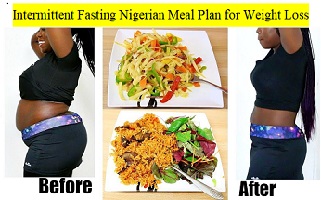Intermittent Fasting Meal Plan for Weight Loss Nigerian
Free Intermittent Fasting Meal Plan for Nigerian Weight Loss. Please Watch this one-minute video >>>
Recently, intermittent fasting has become quite fashionable, and for good reason. It may be simpler than conventional fasting and is an efficient approach to maintaining or decreasing weight.
Table of Contents
Related topics on Intermittent Fasting Meal Plan for Weight Loss Nigerian >>>>
- intermittent-fasting-by-body-type-for-weight-loss/
- 7-day-gm-diet-plan-for-weight-loss/
- intermittent-fasting-for-weight-loss/
It’s not for everyone, however, so make sure you weigh all of your alternatives before choosing anything.
Weight loss is the main goal of intermittent fasting. Your body will start to lose unneeded weight if you limit your calorie intake and implement meal windows throughout the day. It’s a terrific substitute for conventional fasting since it won’t make you feel worn out or lethargic all day.
Although it may seem a little confusing, we are here to assist you at every step. Your body needs some time to become used to new habits, particularly diets.

You may learn more about intermittent fasting, various fasting techniques, and potential weight loss in the sections below.
Meal Plan for Weight Loss
Starting a weight reduction journey may be exhilarating and difficult at the same time.
While exercise is crucial, it’s important to keep in mind that a healthy diet plan is just as critical for attaining long-term weight reduction.
Creating a meal plan for weight loss that is based on your individual requirements and objectives may provide you with the fuel you need, encourage a healthy relationship with food, and improve your general well-being.
A good meal plan for weight loss focuses on reducing calories while making sure that your body gets all the nutrients it needs.
This entails making deliberate decisions on meal scheduling, food selection, and portion levels.
Along your weight reduction journey, including a range of nutritious meals, lean meats, fruits, vegetables, and whole grains will also help you feel satiated, fed, and invigorated.
It is important to remember that weight reduction should always be done in a healthy and long-lasting fashion.
Extreme calorie limitations or crash diets may be damaging to your health and often provide short-term effects that are hard to sustain.
Instead, establishing a sensible and balanced eating strategy will position you for long-term success.
We will examine important guidelines and factors for creating a successful Nigerian food plan for weight loss in this manual.
Remember that a healthy lifestyle should include frequent physical exercise and self-care routines to promote your overall well-being.
A well-rounded food plan is just one part of a healthy lifestyle.
What is Intermittent Fasting?
The first people who lived in hunter-gatherer communities practiced intermittent fasting.
Even while these prehistoric societies did not engage in fasting for weight reduction, it did help our bodies develop the ability to go extended periods without eating.
Thank goodness we are not required to hunt and collect our food anymore.
But the fundamental principle of intermittent fasting is still the same: you allow your body to burn more calories and fat during brief windows of time throughout the day or week when you may eat.
What Happens When You Intermittently Fast?
The body begins to use stored carbohydrates and begin to burn fat after many hours without eating.
Extended fasting periods are neither realistic nor beneficial; instead, intermittent fasting enables you to eat at certain intervals throughout the day to maintain a high level of energy and prevent your blood sugar from going too low (which is what your body needs for fuel).
The majority of diets concentrate on what you can eat, but intermittent fasting concentrates on when you can eat.
This change in emphasis does not imply that you should consume all the food you desire within your eating window, since harmful foods and empty calories may still prevent you from losing weight, regardless of how often you consume them.
To benefit from intermittent fasting, maintain a nutritious diet and regular exercise.
You undoubtedly have questions regarding the various approaches to intermittent fasting. There are many, therefore we’ve chosen some of our favorites and what we think is the most useful.
What Are the Different Types of Intermittent Fasting?
If you’re thinking about beginning an intermittent fasting diet, we strongly advise that you carefully read the advice provided below.
While some types are a bit milder, others may be severe. When determining which approach best suits your requirements, bear in mind that each approach has advantages and disadvantages.
The 16/8 Approach
The 16/8 approach is a wonderful place to begin if you want to get into intermittent fasting gradually. Out of all the strategies on our list, it is the most straightforward and well-liked.
The 16/8 diet involves a 16-hour fast followed by eight hours of eating per day. Within the 8-hour timeframe, you may easily squeeze in two nutritious meals that are separated by 4 hours.
Additionally, if you find yourself becoming excessively hungry, especially in the beginning, nutritious snacks like fruit and protein bars may also help quell your desires.
If you give the 16/8 technique some thought, you may deconstruct it as follows: if you sleep for 7 hours every night, those hours will automatically count towards your fasting time.
You can easily squeeze in a healthy breakfast, a late lunch, or an early supper if you decide to start your eating window at 9 or 10 am.
A simple approach to begin your intermittent fasting adventure is using the 16/8 technique.
Eat-Stop-Eat Technique
The eat-stop-eat (ESE) diet may be difficult for you if you have never attempted a fasting-oriented diet, but it is also the most successful.
You choose two days of the week for a 24-hour fast while using the ESE technique.
The first few weeks of ESE will be challenging if your body is not used to going for extended periods without eating. The fasting intervals may be spaced out whatever you choose; they don’t have to be and shouldn’t be consecutive.
It may seem like a long time to go without eating for a whole 24 hours. It could be, but as your body adjusts, it will get simpler.
The ESE approach is also the most successful because it gives your body two complete 24-hour fasting intervals, which gives it a lot more time to burn fat and sugar.
If you’ve never fasted before and the ESE approach appeals to you more than the 16/8, we advise beginning slowly.
If you discover that a full day of fasting is too much for you to handle, a window of 18 to 20 hours is a great place to start.
The Warrior Diet
Although in theory informing your loved ones that you’re on a “warrior diet” sounds nice, this approach will put you to the test more than any other diet you’ve ever attempted.
The warrior diet perfectly captures the hunter-gatherer way of life since these people often skipped meals until they were able to carry enough food back with them.
Every day, the warrior diet calls for a 20-hour fast, followed by a 4-hour binge.
The 20-hour fast allows your body plenty of time to process and burn fat before refilling during the meal interval, making the warrior diet very efficient.
To ensure you have the energy to go through the day, you may eat as much as you like at this time.
We don’t advise beginning with this fasting diet if you are new to them. You may give it a try for a week or two and then assess how you feel if you have previously attempted fasting and are intrigued about what this strategy can accomplish for you.
How Much Weight Can You Lose With Intermittent Fasting?
You may be wondering how successful these three well-liked and practical methods of intermittent fasting are now that you are aware of them.
Unfortunately, a variety of variables, including age, sex, weight, the strategy you select, and how closely you adhere to it, will affect how successful they are.
You may lose up to half a pound to an entire pound every week if the diet is appropriately and regularly followed.
This translates to around 2-4 pounds every month. Keep in mind that your mobility is not taken into consideration in this computation.
You may lose up to 6-8 pounds each month if you practice intermittent fasting and continuously exercise.
When you realize that all you have to do is refrain from eating at a few certain times of the day, this estimate is startlingly high.
Even while it may seem more difficult than it is, after your body has adapted to the diet, you may not even realize it.
You’ll quickly reach your weight reduction target if you persist.
Once your body adjusts, intermittent fasting is a terrific weight reduction method.
However, how can you monitor all the advancements you’re making with intermittent fasting or simply a new weight reduction regimen in general?
Free Nigerian Intermittent Fasting Meal Plan for Losing Weight

When used in conjunction with a healthy and balanced diet plan, intermittent fasting may help people lose weight.
While fasting is often discussed, no one ever actually discusses what one eats during a fast.
With the eating plan I’ve provided below, my mum lost 15 pounds in only two weeks with no activity. Compared to the average Nigerian diet plus fasting, this meal plan has fewer carbs.
She solely engaged in daily walking of at least 5,000 steps. An example Nigerian food plan for losing weight while fasting intermittently is shown below:
Although the length of the fast might varies, the 16/8 technique, which calls for a 16-hour fast and an 8-hour eating window, is a popular strategy.
(16-hour period) of fasting
During fasting time, water, unsweetened herbal tea, black coffee, or plain green tea are permitted.
Eating Window (8 hours):
Meal 1 (Breakfast):
- Boiled eggs
- Avocado slices
- A spinach omelet that uses very little oil.
- Green tea without sugar
Snack:
- A few nuts like walnuts or almonds
Meal 2 (Lunch):
- Baked or grilled chicken breast
- Steam-cooked veggies (carrots, broccoli, and cauliflower)
- A small serving of quinoa or brown rice
Snack:
- Greek yogurt topped with a spoonful of chia or flax seeds.
Meal 3 (Dinner):
- Grilled fish, such as catfish, mackerel, or tilapia
- Sautéed veggies (zucchini, bell peppers, and onions)
- Moi Moi, also known as Moin Moin (steamed bean pudding)
(Optional) Snack
- Fruits are cut into slices, such as watermelon, pineapple, or berries.
Keep in mind to drink plenty of water during the day to keep hydrated.
Individual caloric requirements might vary, so it’s vital to pay attention to portion management, pick whole, unprocessed meals, and avoid added sweets and bad fats to get the best outcomes in your weight reduction quest.
The most popular IF that works
One of the most well-liked fasting schedules for weight management is the 16/8 intermittent fasting regimen.
The program limits the intake of calorie-rich foods and drinks to a predetermined 8-hour period each day.
The remaining 16 hours of the day must be spent without eating.
People also ask
What can I eat during intermittent fasting in Nigeria?
Intermittent Fasting Nigerian Diet Meal Plan
| Day | Breakfast | Dinner |
| Time | 11 am – 7 pm | |
| 2 | Green Smoothie | Brown Rice And Chicken |
| 3 | Pancakes and Scrambled Eggs | Whole Grain Pasta With Beef Sauce |
| 4 | Banana Smoothie | Coconut Rice And Fish |
What should I eat a day to lose weight with intermittent fasting?
In essence, the healthiest meals to consume during an intermittent fast are the healthiest things to eat at all times.
Avocados, potatoes, cruciferous vegetables, fish, shellfish, whole grains, nuts, and fermented foods are a few examples of what they are.
The importance of including water in your everyday routine cannot be overstated.
How can I quickly lose weight by eating Nigerian food?
8 Efficient Nigerian Food Weight Loss Techniques
- Consume less carbohydrates
- Reduce Your Oil Use
- Watch the Salt (Maggi)
- Watch Your Drinking
- Pick Your Meats Wisely
- Bake and fry in the oven rather than deep-frying
- Avoid high-calorie snacks such as fan yogo, gala, lacasera, chin chin, buns, and puff puff.
- Consume spicy food
How can I drop 10 kg when fasting intermittently?
Try to finish all of your food in 8 or 10 hours and then go without eating till the following day rather than eating three substantial meals throughout the day.
Choose a window of time—say, from 11 am to 7 or 9 pm—and permit yourself to eat during that period.
You should only consume water or other calorie-free beverages after those times.
Is it okay to consume rice when on an intermittent fast?
Keep Eating Nutritious Food
Eat a lot of fresh veggies, protein, and healthy fats while adhering to intermittent fasting.
You may also consume wholesome carbohydrates from things like sweet potatoes and brown grains.
Which meal should you skip the most while fasting intermittently?
Skipping supper is preferable and simpler when practicing intermittent fasting.
You might start your fasting by having a big snack or an early supper.
According to research, the best approach to follow this diet to lose weight is to fast in the evening and overnight before eating early in the morning.
What foods and drinks are acceptable when intermittent fasting?
Rules for Intermittent Fasting
There is just one rule for intermittent fasting: you may not consume any calories while you are fasting.
This implies that when you’re fasting, you’re permitted to consume black coffee, water, and zero-calorie liquids but not solid meals.
What am I not allowed to consume when intermittent fasting?
The practice of intermittent fasting involves limiting your food consumption to certain times or days over a predetermined period, often a week.
It is advised to stay away from processed meats, sugar, trans fats, and refined carbs when you do consume.
The healthiest options are whole foods like avocado, berries, and lean animal proteins.
What can you eat when on an intermittent fast?
With time-restricted intermittent eating, you only consume beverages with little calories, such as water or black, unsweetened coffee and tea, when fasting.
When you do eat, make an effort to consume a balanced meal full of nutritious grains, fruits, vegetables, and lean protein.
How can I drop 10 kg while fasting in 7 days?
- Following these 7 easy actions can help you lose weight in 7 days:
- Boost proteins, decrease carbohydrates
- Eat real foods instead of packaged junk food.
- Limit your calorie intake.
- Lift weights and include HIIT into your exercise regimen.
- Keep moving, even outside of the gym.
- Investigate intermittent fasting
- Use this advice to lessen water retention.
Is moimoi effective for losing weight?
It helps people lose weight.
Some claim that including Moi Moi in your diet might help you lose weight if you’ve been having trouble doing so.
This is due to the high protein and energy-sustaining complex carbohydrate content of Moi Moi, which may quickly make your stomach feel full and lead you to eat less overall.
Which Nigerian soup helps shed pounds?
Ewedu (Soup with Jute Leaves)
Ewedu is a preferred food for those trying to lose weight due to its low-calorie count.
It is also abundant in antioxidants, important vitamins, and minerals, all of which are necessary for a healthy lifestyle.
Can I lose 5 kg in two weeks by fasting intermittently?
This is the maximum amount of weight loss possible with intermittent fasting.
If you follow the fast properly and make sure it is in alignment with your mind, body, and spirit, you may anticipate a decent weight reduction of 2 to 6 kg per month, outstanding inch loss, and an improvement in energy and cognitive performance.
How may intermittent fasting help you lose 2 kg in a week?
Aim for 10,000 to 12,000 steps each day, but keep in mind that nutrition is the most important factor in weight loss.
Can I lose 2 kg per week by fasting intermittently?
Yes.
Most individuals choose a time throughout the day to fast, which usually lasts 16 to 20 hours.
What occurs after two weeks of sporadic fasting?
You could start seeing changes in your body after starting your intermittent fasting regimen in as little as 10 days.
After two to ten weeks, there is a more noticeable decrease in weight. Remember that your overall health (and how your body feels) are more important than how quickly you lose weight. Yes, quick results are excellent.
Can I eat bread on intermittent fasting?
Whole grains
You should still consume both complex carbohydrates from grains and legumes and simple carbs from fruits when following an IF diet since they both contain advantageous B vitamins.
Healthy complex carbohydrates include whole grains like brown rice, quinoa, spelled, and whole-grain bread, and pasta.
How can I quicken my intermittent fasting weight loss?
Is yogurt permitted while fasting intermittently?
Dairy products, like yogurt or cottage cheese, are ideal for breaking a fast because they are already fermented, making them simpler to digest.
They also provide a decent supply of protein, keeping you full and reducing the likelihood that you will seek snacks before your next meal.
When intermittent fasting, what is the ideal first meal?
Your body will continue to burn body fat as if you hadn’t eaten anything at all if your first meal of the day is only healthy protein (chicken, fish, meat, eggs).
Have a quick snack or two to tide you over until supper two hours after your protein meal.
What is the fastest way to lose weight with intermittent fasting?
Five days a week, eat normally, and two days a week, fast. Eat regularly, but restrict your daily eating window to eight hours.
Take the example of skipping breakfast and eating lunch at 11 a.m. and supper by seven o’clock.
How can I speed up weight loss on intermittent fasting?
How much weight can you lose in a month with intermittent fasting?
6-8 pounds per month
You may lose up to 6-8 pounds each month if you practice intermittent fasting and continuously exercise.
On a 16-hour fast, what can you eat?
On the 16:8 diet, you only drink unsweetened drinks like water, coffee, and tea for 16 hours each day.
You consume all of your meals and snacks during the last eight hours.
Nigerian meal plan for intermittent fasting to lose weight in pdf
Nigerian Diet Meal Plan for Intermittent Fasting for weight loss;
| Day | Breakfast | Dinner |
| Time | 11 am – 7 pm | |
| 2 | Green Smoothie | Brown Rice And Chicken |
| 3 | Pancakes and Scrambled Eggs | Whole Grain Pasta With Beef Sauce |
| 4 | Banana Smoothie | Coconut Rice And Fish |
What should I eat if I want to lose weight during intermittent fasting?
In essence, the healthiest meals to consume during an intermittent fast are the healthiest things to eat at all times.
Avocados, potatoes, cruciferous vegetables, fish, shellfish, whole grains, nuts, and fermented foods are a few examples of what they are.
The importance of including water in your everyday routine cannot be overstated.
Nigerian food plan for intermittent fasting to lose weight
Free Nigerian meal plan for intermittent fasting to lose weight
| Day | Breakfast | Dinner |
| Time | 11 am – 7 pm | |
| 1 | Oats Meal | Grilled Fish |
| 2 | Green Smoothie | Brown Rice And Chicken |
| 3 | Pancakes and Scrambled Eggs | Whole Grain Pasta With Beef Sauce |
Which diet is the most effective for reducing weight in 30 days in Nigeria?
Many individuals use the Whole30 plan, a stringent 30-day elimination diet, to lose weight or treat digestive issues.
For 30 days, the program advises you to avoid eating any alcohol, sweets, grains, legumes, dairy products, or additives. Instead of just a diet, a whole lifestyle change is promoted.
7-day diet plan for weight loss in Nigeria ~ What can I eat to lose weight in 7 days?
Take a Glance at the 7 Days GM Diet Plan: Foods for Weight Loss In 7 Days
- Day 1 of the GM Diet: just fruits.
- Day 2 of the GM diet: just vegetables.
- Day 3 of the GM diet: fruits and veggies.
- Day 4 of the GM diet: milk and bananas.
- Meat for GM Diet Day 5.
- Day 6 of the GM diet: meat and veggies.
- Rice, fruit, and vegetable juice on Day 7 of the GM Diet.
800 calories Nigerian diet plan
How much weight can I lose if I eat 800 calories a day?
Some individuals follow an extremely low-calorie diet, sometimes ingesting just 800 calories per day, to lose weight quickly.
Typically, special foods like shakes, bars, or soups are used in this sort of diet to substitute meals and provide extra vitamins.
A person may lose up to 3 to 5 pounds each week of weight with the use of very-low-calorie diets.
What foods have 800 calories in them?
- Stir-fried chicken on zoodles.
- Chia pudding with almonds and blueberries.
- Omelet with jalapenos.
- Nasi goreng with tofu and vegetables.
- Baked vegetables with a poached egg.
- Sweet potato noodles with turkey with basil and chili.
- Vegetarian nachos are healthy.
- Quinoa salad with pistachios and mint; eggplant steaks.
How can I lose 10 kg in one month?
How to Shed 10 Kg in 30 Days
- Be aware of your diet. Make sure you are aware of what you are eating.
- Skip the fast food. One of the main causes of individuals gaining weight over time is eating junk food.
- Exercise
- By consuming as much water as you can
- lower your sugar consumption
- Obtain adequate rest.
- Step on the treadmill
Meal plan for weight loss in 30 days?
Rich in Nutrients Foods
- Broccoli, cabbage, kale, spinach, sweet potatoes, onions, and celery are a few examples of vegetables.
- Whole grains including oatmeal, quinoa, and brown rice.
- Lentils, beans (kidney beans, black beans), and peas are examples of legumes.
- Fruits such as berries (raspberries, blueberries), apples, bananas, pears, peaches


